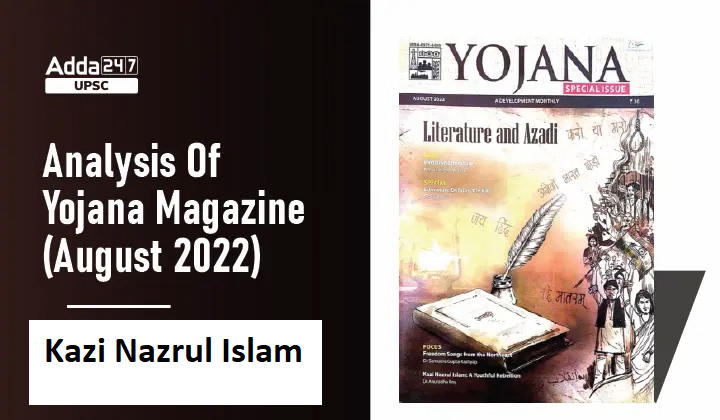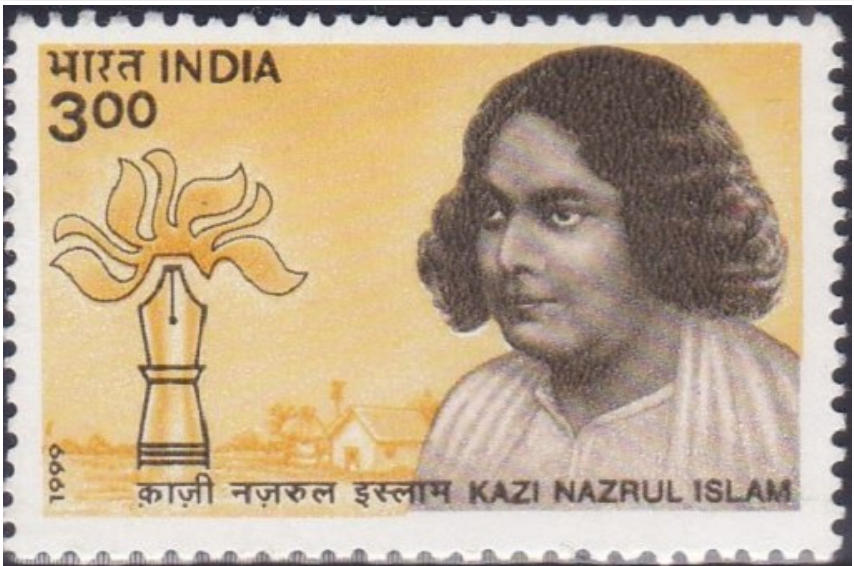Table of Contents
Yojana Magazine is a very important and indispensable source for UPSC Civil Services Exam Preparation. Here, we come with ”Analysis Of Yojana Magazine” which covers the monthly Yojana Magazine keeping in mind the demand of UPSC, particularly from the topics of important government schemes.
In ‘‘Analysis Of Yojana Magazine,” we cover each and every topic of the Yojana edition of a particular month and provide an easy-to-understand gist.
This topic-wise analysis is prepared from the August 2022 edition of the monthly Yojana Magazine.
Kazi Nazrul Islam: Introduction
- Kazi Nazrul Islam(1899-1976) became a major icon of the national movement in Bengal. His role as the leading poet of the freedom movement in the long decade of the 1920s was largely owed to the political situation of that time.
- Kazi Nazrul Islam became the chief vehicle of this spirit through both his literary and political efforts.
Kazi Nazrul Islam: Who was Kazi Nazrul Islam?
- Kazi Nazrul Islam (1899-1976), the Revolutionary Poet of Bengal, hailed from humble beginnings.
- His literary career began with contributions to periodicals and his poems were noted for their intensity of emotions.
- The publication of the poem “Vidrohi” (The Rebel) in 1922, established his distinctive voice in Bangla poetry. He composed nearly 3000 songs.
- His famous lyrics “Bisher Banshi”, “Agamoni”, “Pralay Veena”, “Dolan Champa”, “Samyawadi”, etc. inspired the people to join the movement for independence.
- He used to set his poems to tune, gaining considerable popularity through the Calcutta station of All India Radio.
- The international dimension added to the freedom movement, too, owed to the First World War and was reflected in Nazrul’s wartime story ”Byathar-Dan(A Gift Of Agony)”.
- In 1942, while participating in a program on All India Radio, he fell ill and lost his power in Bangladesh, where he breathed his last in 1976.
- He was conferred a number of awards, as a tribute to his outstanding works, the most prominent being “Padma Bhushan”, the national award, and “Ekushey Padak” from the Government of Bangladesh.
Kazi Nazrul Islam: A Revolutionary Poet
- Nazrul became a major factor behind the revival of militant nationalism in Bengal during the 1920s.
- In 1920, Nazrul and his friend Muzaffar Ahmad brought out the anti-British daily ‘Nabayug’ (launched by A K Fazlul Haq as the mouthpiece of his Krishak Praja Party).
- In 1922, while supporting Gandhi’s non-violent satyagraha, Nazrul was building up the vocabulary of rebellious youth which can be seen in his works such as ‘Bhangar Gan’ and ‘Bidrohi’ (The Rebel).
- His weekly ‘Dhumketu’ announced the objective of complete independence and suggested militant means to achieve it. The revolutionaries were hugely inspired by his Dhumketu. The Jugantar Party even claimed it as its own organ.
- Nazrul was sentenced to a year of rigorous imprisonment on a charge of sedition in 1923.
Kazi Nazrul Islam: A Socialist Poet
- Inspired by the Bolshevik Revolution, socialism dedicated to the cause of workers and peasants attracted even many militant nationalists in Bengal.
- He wrote a number of poems protesting against the deprivation of the poor and hailing their awakening, and criticizing the subordination of women, the hypocrisy and corruption of the priests of all religions and inequality and exploitation embedded in socio-religious and economic power structures.
- He preached political and social revolts in this defiant spirit and also referred to military adventures, geographical discoveries, mountaineering and so on, glorifying the power of youth all the time while doing so.
- He was against religious orthodoxy and criticized both Muslims and Hindus for their bigotry and superstitions. He tried to create a composite literary language and a shared literary space accommodating both Bengali Hindu and Muslim sensibilities.
Kazi Nazrul Islam: Tagore and Najrul
- All are overshadowed by Tagore’s imposing persona; but not Nazrul.
- In fact, Tagore admired this rebel poet, 38-years his junior, to such an extent that he dedicated ‘Basanta’, a play in 1923 to Nazrul who candidly admitted that Tagore’s sophisticated works inspired poets like them while they wrote for the masses.
- Shocked by Tagore’s death in 1941, Nazrul composed two poems including ‘Rabi-hara’ which was a part of Tagore’s funeral broadcast on the All India Radio.
Kazi Nazrul Islam: Rebellious to religious
- Within this short span of his creative life, he had composed four thousand songs apart from other literary and journalistic works.
- His songs changed from the rebellious to religious explorations at a later stage.
- He delved deep in both Hindu and Islamic practices and extensively composed over five hundred devotional songs extolling Kali, Shiva, Krishna, Saraswati along with the infinite Brahma and Shakti, the primordial energy.
- Some of his songs are steeped in Tantric cult while some have captured the essence of Madhura-bhakti of Vaishnavs.




 TSPSC Group 1 Question Paper 2024, Downl...
TSPSC Group 1 Question Paper 2024, Downl...
 TSPSC Group 1 Answer key 2024 Out, Downl...
TSPSC Group 1 Answer key 2024 Out, Downl...
 UPSC Prelims 2024 Question Paper, Downlo...
UPSC Prelims 2024 Question Paper, Downlo...
